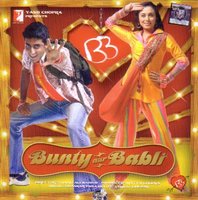

In the recent months, a Hindi film, Bunty Aur Babli, starring the father-son duo of Amitabh Bachchan and Abhishek Bachchan, did very well on the box office in India. The critics also appreciated the film for its portrayal of the aspirations of the youth of today's middle class India. I was pleasantly surprised when Arundhati Ray quoted a line from this film in her interview in the weekly Tehelka:
"There is the danger, especially for a writer of fiction, that you can become somebody who does what is expected of you. I could end up boring myself to death... It can be maddening, and I want to say like Bunty in Bunty aur Babli, ‘Mujhe yeh izzat aur sharafat ki zindagi se bachao…’"
Save me from this life of honor and gentlemanliness!
The interview is really interesting. In fact, all of Roy's interviews are thought-provoking. She has a fascinating way of putting things together, building a context, making a point. I quote some more--my favs from the same interview.
On the politics of resistence
"The facts are there in the world today. People like Chomsky have made a huge contribution to that. But what does information mean? What are facts? There is so much information that almost all becomes meaningless and disempowering. Where has it all gone? What does the World Social Forum mean today? They are big questions now. Ultimately, millions of people marched against the war in Iraq. But the war was prosecuted, the occupation is in full stride. I do not for a moment want to undermine the fact that unveiling the facts has meant a huge swing of public opinion against the occupation of Iraq, it has meant that America’s secret history is now street talk, but what next? To expose things is quite different from being able to effectively resist things."
On fame
"At the end of the day, fame is also a gruesome kind of capitalism, you can accumulate it, bank it, live off it. But it can suffocate you, block off the blood vessels to the brain, isolate you, make you lose touch. It pushes you up to the surface and you forget how to keep your ear to the ground. "
On money
"As for money, I have tried to take it lightly. Really, I have tried to give it away, but even that is a very difficult thing to do. Money is like nuclear waste. What you do with it, where you dump it, what problems it creates, what it changes, these are incredibly complicated things. And eventually, it can all blow up in your face. I’d have been happier with Less. Yeh Dil Maange Less. Less money, less fame, less pressure, more badmashi. I hate the f***ing responsibility that is sometimes forced on me. I spent my early years making decisions that would allow me to evade responsibility; and now…"
On the culture of celebrityhood
"People are constantly in search of idols, heroes, villains, sirens — in search of individuals, in search of noise. Anybody in whom they can invest their mediocre aspirations and muddled thinking will do. Anyone who is conventionally and moderately ‘successful’ becomes a celebrity. It’s almost a kind of profession now — we have professional celebrities — maybe colleges should start offering a course.It’s indiscriminate — it can be Miss Universe, or a writer, or the maker of a ridiculous TV soap, the minimum requirement is success. There’s a particular kind of person who comes up to me with this star-struck smile — it doesn’t matter who I am — they just know I’m famous; whether I’m the ‘BookerPrizeWinner’ or the star of the Zee Horror Show or whatever is immaterial."
On failure
"In this freak show, this celebrity parade, there’s no place for loss, or failure. Whereas to me as a writer, failure interests me. Success is so tinny and boring. Everyone is promoting themselves so hard."
On search for perfection
"I think we all are just messing our way through this life. People, ideologues who believe in a kind of redemption, a perfect and ultimate society, are terrifying. Hitler and Stalin believed that with a little social engineering, with the mass murder of a few million people, they could create a new and perfect world. The idea of perfection has often been a precursor to genocide. John Gray writes about it at some length. But then, on the other hand, we have the placid acceptance of Karma which certainly suits the privileged classes and castes very well. Some of us oscillate in the space between these two ugly juggernauts trying to at least occasionally locate some pinpoints of light. "
To read the entire interview, click here.

2 comments:
ooo i enjoyed this. how are you zafar? i have yet to go down to singapore...
Thanks DZ. Am ok. When are you coming down? Let me know when you do.
Post a Comment